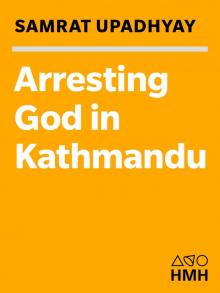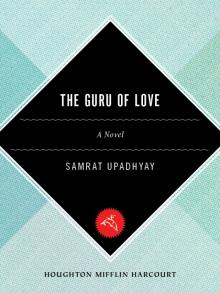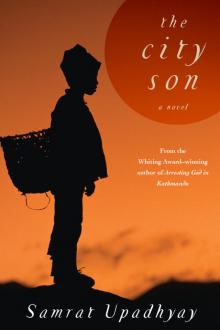- Home
- Samrat Upadhyay
The City Son Page 2
The City Son Read online
Page 2
The Masterji trudged back home on the narrow paths of the hills. There were several moments during that journey when he could have swerved onto a different route, descended to a different village, then perhaps a few more villages until he reached a place from where a bus could carry him into the plains, where he could have disappeared. But he went home and helped his father prepare for the wedding.
Once they got married, the Masterji gradually came to appreciate his wife, even though he spent most of the year in the city. Despite all the cruel comments that had been flung her way throughout her life, she was even tempered and hardworking. She took care of the Masterji’s father as he became increasingly feeble and sickly. She spoon-fed him and bathed him with a towel. She was ferocious in bed, during those times when the Masterji visited. She was like a tigress who took immediate control. She clawed and scratched and was inexhaustible. When the Masterji got tired, she rode him, with abandon, uncaring of the noise—the rocking, the crunching, the moans, and the whimpers. She made him cry, gasp, and, occasionally, shout—so loud and rollicking was their lovemaking. She was bigger than he, and he had always been thin and academic looking, so when she climbed on top he became a little afraid. During those perspiring nights, she didn’t tolerate any excuse or demurring from him. Her physical prowess was so strong that had he made a false move she’d have surely struck him. The pleasures he experienced those nights—her ample thighs and arms enveloping him, smothering him—were so severe that in the morning, once she became quiet and respectful like a traditional housewife, he wondered if he had dreamed them.
“This type of daughter-in-law only the most supremely blessed people will get in their homes,” the Masterji’s father said in his croaky, throaty voice. To his father, his daughter-in-law was an embodiment of Goddess Durga herself, strong yet sweet, firm yet nurturing. His father thought the bedroom noises were good signs. He saw the depleted yet satisfied face of the Masterji in the morning and thought her lack of beauty was no longer an issue.
But while the Masterji returned to the city happy and contented, mixed in with this satisfaction was a small degree of anxiety about who she was. If I displease her—this thought came to him swiftly, like a small, fast sparrow—she will crush me. In the city the anxiety stayed with him, and it gradually diminished because their distance was so great. But over the years, each time he boarded the bus for the village, he experienced an excited type of dread. He didn’t look forward to seeing her face, but his mind went into a frenzy thinking what she’d do to him at night. Even when he returned for the last rites for his father, she didn’t leave him alone at night. It was not the proper thing to do—the grieving period was supposed to be pure and uncontaminated—and he felt guilty when he returned to the city.
After the birth of their first son, Amit, her body became heavier, and rounder, and she ate twice the amount she had before. He hated the way she ate, opening her mouth wide like a hippopotamus and shoveling her food in with her hand. Her jaws made loud chomping sounds when she ate, but he was afraid to say anything. He wondered if he had been spoiled by the city, as his father had warned, but he could no longer stand the noises she made, for example, when she gargled in the morning—the aakh and the thhoo that went on for eternity. They began to appear uncouth to him, crass and hillbilly.
CHAPTER FOUR
A FEW DAYS later Didi appears with Amit and Sumit in tow in Bangemudha at the Masterji’s new flat. The boys run to their father, who tousles their hair and comments on how they’ve grown since he last saw them.
“You should have informed me,” he tells them after they enter the house with their trunks and their bundles. The beautiful boy and his mother, the Masterji’s city wife, have gone to her mother’s, and he’s expecting them to arrive any minute now. Perhaps he can take Didi and his two sons to another location, offer an excuse about why they can’t stay here. “My students will be arriving here shortly,” he complains.
“We came a long way on the bus,” Didi says. The boys are looking out of the window at the neighbor’s house, where some children are flying a kite on the roof. The Masterji thinks of lines from a famous poet that speak of the neighborhood in chaos after a child falls out of a window.
“There’s not even food in the house to eat,” the Masterji says. “Perhaps for tonight you and the boys—”
“Food is here.” Didi turns her back to him, kneels, and opens the trunk, from where she proceeds to extract various items: flattened rice, anarsa and sel for the Masterji’s sweet tooth, and some fruits. Amit reaches into his bag and pulls out a wooden container filled with mohi, the buttermilk splashing inside, another village staple that’s the Masterji’s favorite.
“Do you want some?” Amit says, and his father detects a hint of mockery in his voice.
When Tarun and his mother, Apsara, arrive about an hour later, Didi is cooking in the kitchen, her back to them. She doesn’t turn to look. Amit and Sumit are playing a game of snakes and ladders in the corner, and they stop, their eyes first on Apsara, then on Tarun. The Masterji is sitting on the bed. Apsara pauses in the doorway, her hand holding a bag of spinach she was going to cook. Her instinct is to grab Tarun by his hand and leave. But all she can do is look at the floor, an intruder in her own house. “Come in,” the Masterji finally says. “Go,” Apsara says to Tarun, who goes to his father, leans against him on the bed. He puts his arm around Tarun, tentatively. Apsara continues to stand in the doorway, her gaze lowered; occasionally when she looks up, it’s on Didi’s back that her eyes land. Didi is stirring her vegetables and her rice, then she turns and faces Apsara, says, “You must be surprised, to have these uninvited guests in this house.”
Apsara shuffles toward Didi, like she’s about kneel on the floor and prostrate.
“There was no meat in the house,” Didi says, “so it’ll just have to be rice and radish today. It’s nearly done.”
Apsara offers her the bag of spinach.
“Keep it,” Didi says. “It looks kind of yellowed anyway.”
Apsara sits on her haunches in the kitchen, watching as Didi stirs for a final time, then turns off the stove. Didi ladles some rice and radish onto a plate and tells Amit, “Take the plate to your father.” Then she ladles rice and radish for all the children. The children, along with Apsara, sit on the floor next to the bed and eat. For some reason Tarun is hungry that evening and finds everything delicious. His mother picks at her food. The Masterji eats in bed; he is mostly quiet. At one point, he lifts his head and says, “The salt is just right in the radish.” Didi doesn’t eat, just watches. Her eyes are specially reserved for Tarun, on whom she bestows small, encouraging smiles. Amit and Sumit eat huge mounds of rice, then burp loudly two or three times. Once the Masterji is done, he leaves the plate near Didi and washes his hands and gargles in the sink. Apsara, her meal barely touched, stands and goes to the bathroom, from where she doesn’t emerge for an hour.
That night Didi sleeps in a corner with her two sons. Tarun and Apsara sleep in another corner, where Apsara laid bedding for the two of them soon after she emerged, her face weary, from the bathroom. “It’s time to sleep,” she told Tarun in a low voice. Didi had taken an incredibly long time to eat, and then she had washed the dishes and stacked them by the sink. She had laid her own bedding near the kitchen, where her two boys are now lying. Amit is staring at the ceiling, alert to the movements around the room. He knew, before they boarded the bus to the city, that his father was up to no good, and a hard type of anger had come into his eyes. In the village, people speak of him as a troublemaker. Sumit is reading a musty book belonging to his father. He is a sharp contrast to his brother: always smiling, sweet tempered, soft voiced, ready to acquiesce. He loves to read and is eager to share new things he’s learned from his books. The Masterji remains in the same position on the bed. Soon, Didi is snoring with her back to the room, a low but steady snore that threatens to last the night.
Tarun falls asleep, then wakes up a couple of hours later to sil
ence so deep that it feels like a dream. He can see his father’s silhouette on the bed—at some point he must have turned off the light. Apsara is also awake. He is thirsty, so he stands and makes his way to the kitchen, where he tilts the gagro and pours himself a glass of water. He drinks, facing the room. His glance falls upon Didi, whose eyes are open and observing him. As Tarun returns to his bed, the Masterji reaches out and clasps his arm, like the hand of a ghost in the dark. Then his father lets him go, and the boy returns to his mother.
The Masterji, despite his education and his name, crumples and is cowed by Didi’s arrival. Every morning Apsara rouses herself from her bed, ready to battle the day, perhaps to confront her husband or to stand up to Didi, tell her that the Masterji is also her husband, married legitimately in a temple. But her resolve is short-lived. Once she has to face Didi with her buffalo-like presence and her large, staring eyes, Apsara weakens. Didi has taken over the kitchen. With her body language and expressions she suggests that Apsara doesn’t know how to cook, that the Masterji thus far has been eating lousy food. Didi dusts in places where there’s no dust; she takes the Masterji’s mattress out to the yard and beats it ruthlessly. She entrusts her older son, Amit, instead of Apsara, with going to the market to fetch groceries. Within a few days of her arrival, the Masterji is already handing over to Didi the income from his tutees. Apsara hardly gets a moment alone with the Masterji, who avoids being with her alone and refuses to meet her eyes. Whenever she approaches him, his eyes dart toward Didi, who, even with her back turned toward them, knows what is going on. Apsara looks windblown, and she has taken up the habit of wringing her hands, digging her nails into her palms.
At night, Apsara twitches and jerks, her face buried in her pillow. Tarun doesn’t know whether she has spoken to anyone at work—she’s a teller at a bank—about what has happened at home. One afternoon the neighbor next door, who has a phone, knocks on the door and says that Tarun has a call. Tarun has just returned from school, and Didi has handed him a boiled egg and a glass of milk. The Masterji is tutoring a student on the bed. “He’s eating his snacks,” Didi says to the neighbor. She feeds Tarun well, as though he’s her own child, and on Saturday she takes him out to the yard and gives him a good bath, scrubbing him and rubbing the soap vigorously all over his body, while Apsara watches from the window. He always feels refreshed and lighter afterward.
“Who’s on the phone?” Didi asks the neighbor, who mumbles he doesn’t know. “Then he won’t come,” she says. The neighbor watches her worriedly, then says, “It might be his mother. The line was bad, I couldn’t tell.” Busy with his tutee, the Masterji doesn’t hear this conversation.
Didi signals Tarun to go, so he follows the neighbor to his house. “Tarun, call your father to the phone,” Apsara whispers when he picks up the phone. “But don’t announce it’s me.” Then, “Where is she?”
“She’s in the house,” Tarun says. Didi rarely leaves the house; his mother knows that. The neighbor is standing in the doorway, listening. “Didi knows it’s you on the phone,” Tarun tells his mother.
“I told our neighbor not to announce it’s me!” Apsara is breathing hard.
Tarun waits for her instructions. She must have gathered her courage at the other end, because when she speaks her voice is firmer. “Tell your father it’s me, and tell him to come to the phone immediately.”
“Where are you calling from?”
“From the bank, Tarun, quickly please.”
Tarun puts down the phone and brushes past the neighbor to go next door to his house. Didi is doing something in the kitchen, her back as usual to the room. Tarun sits next to his father on the bed, pokes him on the thigh, and says, “Phone next door.”
Without looking at him, the Masterji asks, “Phone? For me? Who’s calling?”
“It’s important.”
“Who is it?”
When Tarun doesn’t answer, both the Masterji and his tutee look at him.
Tarun’s boiled egg and glass of milk are still unconsumed. Amit and Sumit are lounging in their corner bed. They arrived home from school earlier than Tarun and have already eaten their snacks.
Once Tarun’s father realizes who’s on the phone, his eyes drift toward Didi. “What does she want?” the Masterji whispers to Tarun.
Tarun shakes his head.
The tutee asks the Masterji a question. The Masterji says to Tarun, “Tell her we can talk when she comes home.”
Tarun returns to the neighbor’s and tells his mother what the Masterji said.
After a pause Apsara says, “Tell him that I’ll continue to hold.”
When Tarun goes home and informs his father, the Masterji says, “Okay, let me finish this section, then I’ll go.” Tarun stays with his father, hoping that he’ll soon put on his slippers, but the Masterji doesn’t get up.
Apsara returns home late in the evening, so subdued that she looks like someone who’s just been fired from her job. Since she’s also three hours late and it has turned dark outside, everyone has already eaten.
No one mentions the phone call. Apsara changes in the bathroom and comes to bed. The Masterji is already in bed, and only one light burns in the flat. Tarun is lying on his side, reading. Apsara rumples his hair and whispers, “Did you eat?”
Tarun nods.
“There’s food for you,” Didi says from her corner. “On a plate in the kitchen.”
“I’m not hungry,” Apsara says.
“Then why do I slave in this house, cooking and cleaning? And he breaks his back teaching, just so we have the luxury of wasting our food?”
Apsara jerks up, rapidly moves toward the kitchen, grabs her plate, and returns to Tarun. She eats, shoving the rice into her mouth in a whimpering, helpless anger. She gags and coughs as she eats.
CHAPTER FIVE
A FEW WEEKS later Apsara finds a flat for the two of them in Kupondole. She doesn’t want to go to her parents’ house because she doesn’t want to admit to anyone her defeat.
The mother and the son live on the second floor of a large building, in a room that overlooks the main street and even provides a glimpse of the Bagmati Bridge and a small section of the river. Apsara enrolls Tarun in an English medium school up the hill in Jawalakhel, so every morning a bus picks him up from outside the building and transports him to school.
A couple of weeks after he begins, his Nepali teacher, a short man with a thick, flat face, asks Tarun, “Is it true that your father left your mother?”
“My mother left him.”
“Right, right. But do you visit him, your father?”
Tarun nods.
“Does your father love you?”
Tarun hesitates, then nods. He’s sure that his father loves him, but since Didi’s and the boys’ arrival the Masterji has been uncomfortable showing his affection. Before, he used to take Tarun to Ratna Park, where they kicked around a rubber ball, and he fed his son ice cones from roaming vendors. But after Didi came, his father has become reserved. Now it’s Didi who is physically demonstrative. She tousles his hair, wipes his face, and says, “You should have been born my son,” even in front of Amit and Sumit and, once, before they moved to Kupondole, with his mother listening.
“I’m sure your father loves you,” the teacher says. His smile gets funnier. “And your mother? She must be feeling quite lonely?” He has pulled Tarun to a table in the teachers’ lounge to have this conversation. “I have seen your mother. Such a nice-looking woman yet such a sad situation.” He flips a pen in his fingers, repeatedly. “I wish I could come to your house to talk to her. What do you think, Tarun? To discuss your studies, your progress. Maybe have a cup of tea? Ha! Ha! Khair, it doesn’t matter if she doesn’t know how to make tea. I will take you two for sweets to Ram Bhandar. You know Ram Bhandar? Yes? I thought so. Ha! Ha! You like sweets, don’t you, Tarun? I can tell. Rasgulla? Laddoo? What else do you like to eat?”
But when Tarun gives his mother the slip of paper on which he has written his
teacher’s name and a phone number, she stares at the paper and says, “You’re so good.” She hasn’t absorbed anything Tarun has said.
Apsara found work at a bank in Thapathali after they moved to Kupondole. Every morning she crosses the bridge to go to work, and it’s good that she doesn’t have to venture into the city center, where the chances of running into Didi are high. Apsara has begun mumbling to the stove when she cooks. Some days Tarun finds her talking to the wall; she shakes her head and says, “Nai, nai,” or “Hoina, hoina. Hundaina.”
One evening, he and his mother are on their way to New Road for a purchase or two before heading home. They were delayed in Kamalachhi, where his school uniform was being sewn. It’s getting dark, and Apsara is nervous at being in such close proximity to Bangemudha, near Didi.
In Asan they come upon a gathering. Tarun loves spectacles—magic shows, circuses featuring children doing impossible contortions, street theater—and he tugs at his mother, asking her to stop. “Late hunchha, babu,” she says. Her eyes dart about, apprehensive. A tremor runs through her body. Sometimes when he holds her hand on the street, he feels something travel up and down her skin—a small dose of terror. It’s as though her body is reliving, in intervals throughout the day, her first encounter with Didi. In their new flat in Kupondole when she hunches over the stove, she appears to stop breathing for a few seconds until the current passes through her. Every time this shiver journeys through her, it inflicts a smidgen of damage, so tiny that one would probably have to put it under a microscope to see it, but it’s there.
“One moment,” he says as he disengages his hand from hers and pushes through the crowd to the front. Lit by bright portable lamps, a figure is dancing. It is wearing a traditional mask of a wrathful god—bulging eyes, thick lips, baring sharp teeth, its face a mélange of colors. The dancer has on a colorful frock and a tunic with frills that sweep the air as he moves. There is music—loud drums and cymbals—but Tarun can’t locate the players. The music appears to descend from the sky above and roll over the people. The mask terrifies Tarun, but then at times its eyes appear not angry but kind. Without realizing it—and possibly to escape his near-wailing mother—Tarun has stepped into the clear space allotted to the dancer by his audience. “Babu, kahan harayau timi? Harey! Yetro bheedma. Tarun!” But Apsara’s voice, muted by the loud crashing and banging around him, doesn’t persuade him.

 Arresting God in Kathmandu
Arresting God in Kathmandu Mad Country
Mad Country The Guru of Love
The Guru of Love The City Son
The City Son